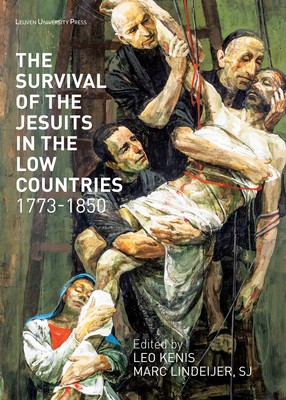
- Išsiųsime per 10–14 d.d.
- Leidėjas: Leuven University Press
- ISBN-10: 9462702217
- ISBN-13: 9789462702219
- Formatas: 17.2 x 23.6 x 2.4 cm, minkšti viršeliai
- Kalba: Anglų
- Extra -15 % nuolaida šiai knygai su kodu: ENG15
The Survival of the Jesuits in the Low Countries, 1773-1850 + nemokamas atvežimas! | knygos.lt
Atsiliepimai
Aprašymas
In 1773, Pope Clement XIV suppressed the Society of Jesus. For the 823 Jesuits living in the Low Countries, it meant the end of their institutional religious life. In the Austrian Netherlands, the Jesuits were put under strict surveillance, but in the Dutch Republic they were able to continue their missionary work. It is this regional contrast and the opportunities it offered for the Order to survive that make the Low Countries an exceptional and interesting case in Jesuit history.
Just as in White Russia, former Jesuits and new Jesuits in the Low Countries prepared for the restoration of the Order, with the help of other religious, priests, and lay benefactors. In 1814, eight days before the restoration of the Society by Pope Pius VII, the novitiate near Ghent opened with eleven candidates from all over the United Netherlands. Barely twenty years later, the Order in the Low Countries - by then counting one hundred members - formed an independent Belgian Province. A separate Dutch Province followed in 1850. Obviously, the reestablishment, with new churches and new colleges, carried a heavy survival burden: in the face of their old enemies and the black legends they revived, the Jesuits had to retrieve their true identity, which had been suppressed for forty years.
Contributors: Peter van Dael, SJ (Vrije Universiteit Amsterdam & Pontifical Gregorian University Rome), Pierre Antoine Fabre (Ãcole des hautes études en sciences sociales Paris), Joep van Gennip (Tilburg School of Catholic Theology), Michel Hermans, SJ (University of Namur), Marek Inglot, SJ (Pontifical Gregorian University Rome), Frank Judo (lawyer Brussels), Leo Kenis (KU Leuven) Marc Lindeijer, SJ (Bollandist Society Brussels), Jo Luyten (KADOC-KU Leuven), Kristien Suenens (KADOC-KU Leuven), Vincent Verbrugge (historian)
EXTRA 15 % nuolaida su kodu: ENG15
Akcija baigiasi už 1d.09:43:25
Nuolaidos kodas galioja perkant nuo 10 €. Nuolaidos nesumuojamos.

- Leidėjas: Leuven University Press
- ISBN-10: 9462702217
- ISBN-13: 9789462702219
- Formatas: 17.2 x 23.6 x 2.4 cm, minkšti viršeliai
- Kalba: Anglų
In 1773, Pope Clement XIV suppressed the Society of Jesus. For the 823 Jesuits living in the Low Countries, it meant the end of their institutional religious life. In the Austrian Netherlands, the Jesuits were put under strict surveillance, but in the Dutch Republic they were able to continue their missionary work. It is this regional contrast and the opportunities it offered for the Order to survive that make the Low Countries an exceptional and interesting case in Jesuit history.
Just as in White Russia, former Jesuits and new Jesuits in the Low Countries prepared for the restoration of the Order, with the help of other religious, priests, and lay benefactors. In 1814, eight days before the restoration of the Society by Pope Pius VII, the novitiate near Ghent opened with eleven candidates from all over the United Netherlands. Barely twenty years later, the Order in the Low Countries - by then counting one hundred members - formed an independent Belgian Province. A separate Dutch Province followed in 1850. Obviously, the reestablishment, with new churches and new colleges, carried a heavy survival burden: in the face of their old enemies and the black legends they revived, the Jesuits had to retrieve their true identity, which had been suppressed for forty years.
Contributors: Peter van Dael, SJ (Vrije Universiteit Amsterdam & Pontifical Gregorian University Rome), Pierre Antoine Fabre (Ãcole des hautes études en sciences sociales Paris), Joep van Gennip (Tilburg School of Catholic Theology), Michel Hermans, SJ (University of Namur), Marek Inglot, SJ (Pontifical Gregorian University Rome), Frank Judo (lawyer Brussels), Leo Kenis (KU Leuven) Marc Lindeijer, SJ (Bollandist Society Brussels), Jo Luyten (KADOC-KU Leuven), Kristien Suenens (KADOC-KU Leuven), Vincent Verbrugge (historian)




Atsiliepimai